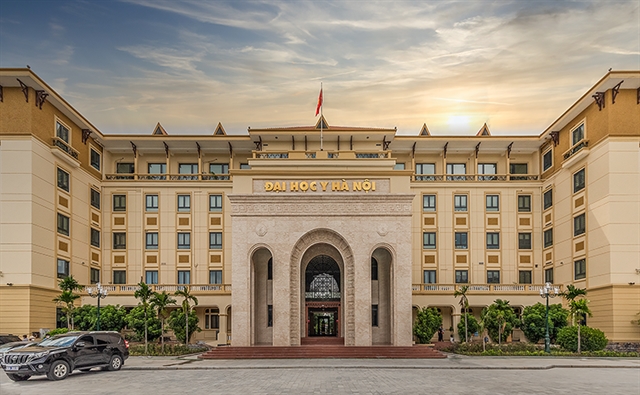 Society
Society


|
| Hà Nội Medical University. Photo hmu.edu.vn |
HÀ NỘI — Hà Nội Medical University has ambitious plans to develop into a national key higher education institution, ranked among the top universities in Asia.
By 2035, the university aims to be listed among the top 100 universities in Asia and within the 801-1000 range globally, with at least two of its fields ranked within the top 150 in reputable international rankings.
The ambitious vision follows the recent approval of Decision No. 714/QĐ-TTg by Deputy Prime Minister Lê Thành Long, which endorses the proposal for Hà Nội Medical University to become a national education hub, positioned as one of the leading institutions in Asia.
The objective of the plan is to develop Hà Nội Medical University into a prestigious national institution of higher education, comparable to the top universities in Asia.
It aims to play a central role in training high-quality human resources, closely linked to scientific research, technological development and innovation in the health sector, thus meeting the increasing healthcare needs of the public.
By 2035, Hà Nội Medical University intends to expand its number of students to over 20,000, with postgraduate and equivalent enrolments accounting for more than 50 per cent of total admissions.
All of the university's educational programmes will be accredited by internationally recognised quality assurance organisations.
The number of international publications will increase by 10 per cent annually, with at least 1,000 articles published every year by 2035, ensuring a minimum of 0.75 publications per full-time faculty member per year.
The university will also establish at least 20 world-class research institutes, centres and laboratories, gradually mastering several strategic technologies for application in health-related scientific research.
By 2035, each of the university's training facilities will have at least one primary practical facility and at least five university-affiliated hospitals will meet international quality standards.
The total number of full-time faculty members will reach at least 1,700, with over 70 per cent holding doctoral degrees.
Thirty per cent of faculty with doctoral qualifications will hold professorial or associate professorial titles. Furthermore, the university aims to enrol at least 500 international students in its programmes.
Strategies for achieving the goals
To achieve the ambitious targets, Hà Nội Medical University will focus on expanding its scale and enhancing the quality of its education.
Key strategies include the development of science, technology, innovation and digital transformation in healthcare, as well as strengthening the conditions to ensure the quality of training, scientific research and healthcare services.
The university will also focus on expanding its training programmes, particularly in its strengths, and will prioritise postgraduate education to meet the growing demand for highly skilled professionals in the workforce.
Furthermore, the university plans to develop high-quality training programmes and international partnerships, offering joint courses that meet global standards. All educational programmes will undergo accreditation by both national and international standards.
In terms of scientific research, technology, innovation and digital transformation in healthcare, Hà Nội Medical University will concentrate on infectious and tropical diseases, non-communicable diseases and the causes of major epidemics.
It will also conduct research in gene-protein technology, diagnostic technologies, treatment methods and prevention strategies for emerging, complex diseases.
The university will foster the development of strong research groups, apply artificial intelligence in research and push forward with technology transfer.
It will expand its network of academic-industry partnerships and commercialise scientific and technological products.
Additionally, Hà Nội Medical University will work to enhance the quality of its educational and healthcare services by expanding its campus and laboratory facilities.
New training centres and practical facilities will be built to meet the demands of growing enrolment and improve the quality of education.
The university will also expand its network of affiliated hospitals in Hà Nội, Thanh Hóa, Bắc Ninh and other provinces. VNS




